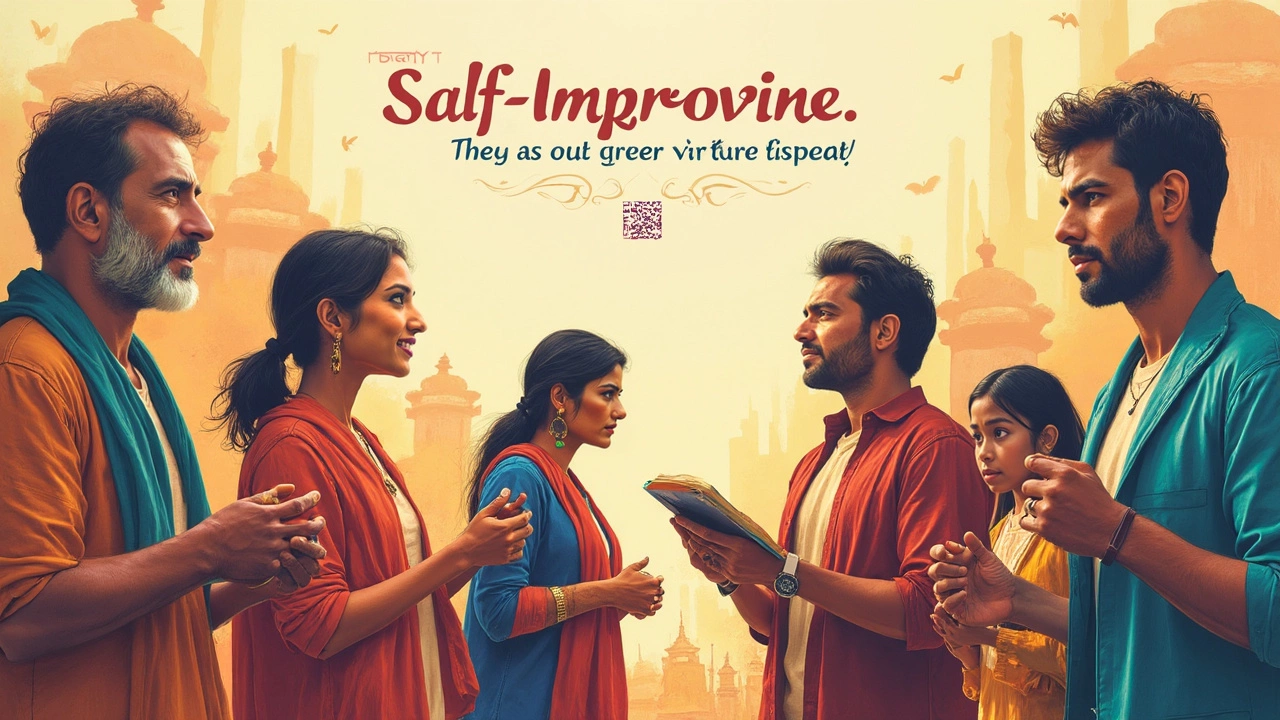
So, you want to get better at this whole 'living your best life' thing. It's not just about getting fit or landing that dream job – personal development goes way deeper. And guess what? You don't need to climb a mountain or meditate with monks to see some progress. It all starts with understanding yourself better. Seriously, knowing what makes you tick is the first step in the whole self-improvement journey. Your strengths, your weak spots, what fuels your passion – these are your personal guideposts.
Once you’ve got that down, it's time to focus on setting some real-deal goals. And I'm talking about clear, actionable steps, not just vague wishes. Think about where you want to be and define it. Setting goals is like building a roadmap for your future, one that's uniquely yours.
Know Yourself
Alright, let's get to the core of it—knowing yourself is like having the ultimate cheat code in the game of life. You ever tried putting together IKEA furniture without the manual? That’s what life feels like when you don’t really know who you are at a deeper level. So, where to start?
First off, reflect on your strengths and weaknesses. Knowing these can help guide your choices in life. Are you a whiz at problem-solving but struggle with social situations? Play to your strengths while working on those areas that could use a little TLC.
Another key aspect is understanding your core values. These are like your life’s North Star—they help steer you in the right direction. Want a life filled with excitement, creativity, or maybe reliability? Once you know your values, making decisions becomes way simpler.
Personality and behavior assessments can also give you some solid hints. Tools like the Myers-Briggs Type Indicator or the Enneagram provide insights into your personality type, how you interact with others, and what kind of activities suit you best.
You can also ask for feedback from people who know you well. Sometimes we’ve got blind spots, and hearing an outsider's perspective can be eye-opening. Just remember, it's all about self-growth, not self-criticism.
Personal development starts with awareness. Understand what makes you tick, and the rest becomes a bit more digestible. Keep in mind, we’re all a work in progress, so don't stress about having it all figured out just yet.
Set Clear Goals
Alright, so you’re pumped to start working on yourself, but without goals, it's like a road trip with no destination. Crafting clear and precise goals is essential for your journey in personal development. You're gonna want to make these goals SMART – that stands for Specific, Measurable, Achievable, Relevant, and Time-bound. This framework helps you focus on what you really want.
Start with specific goals. Think about questions like: What exactly do you want to achieve? Why is this goal important? For instance, instead of saying "I want to get fit," aim for something like "I want to be able to run 5 kilometers without stopping by July." You get the idea?
Next is measurable. You need some metrics to track your progress. If a goal isn’t measurable, how do you know if you’ve reached it? This could mean setting steps like "I'll run a kilometer more each week."
Achievable is super important. Goals should stretch you a bit but still be possible. There's no point in setting goals so high that you'd need a miracle to achieve them. Pick something challenging but doable, giving you room to grow.
Make sure the goals are relevant to your life. They should align with where you want to head in life. If a goal doesn't fit with your values or long-term aims, it's likely to get tossed aside when things get tough.
Finally, set a time-bound deadline. This gives you motivation and a sense of urgency. Have dates marked on your calendar to review how close you are to the finish line.
Check out this neat way to visualize your goal-setting efforts:
| SMART Criteria | Question | Example |
|---|---|---|
| Specific | What exactly do you want to achieve? | Run 5km without stopping |
| Measurable | How will you know when it's done? | Track time and distance ran weekly |
| Achievable | Is it realistic? | Start with smaller distances |
| Relevant | Does it matter to you? | Improving health and stamina |
| Time-bound | When will it be achieved? | By July |
Remember, once you’ve got the goals down, don’t keep them locked in a drawer. Review your goals regularly, celebrate your wins, and keep pushing forward. They guide you, but it's your actions that make the difference! Keep these tips in mind and you'll be well on your way to rocking your self-growth journey.

Take Action
Alright, you've done the whole soul-searching and goal-setting thing. Now, it’s time to actually do something about it. This is where the rubber meets the road in personal development. Without action, all those plans are just dreams floating in your head. Action is where your ambitions come to life, and it's what turns a spoken goal into reality.
Here's the deal: taking action doesn't mean you need to completely change your life overnight. Start small. Think about the first step you can take today. The key is to make these actions specific and manageable. Maybe you’ve decided to work on public speaking. Begin by practicing a five-minute presentation to yourself or a friend. Afraid of the gym? Try a quick home workout to get started.
Consistency is your best friend here. Make a habit out of taking daily actions related to your goals. You’re looking for progress, not perfection. Staying committed to small daily actions is often more effective than sporadic bursts of energy.
Remember that setbacks happen. They don’t mean you’re not getting better; they’re just part of the journey. Keep moving forward, and don’t hesitate to adjust your steps if needed. The most important part of taking action is to keep going, even when the going gets tough.
To help you stay on track, consider keeping a journal or using an app to monitor your progress. Recording what you’ve done can keep you motivated by showing how much you’ve already achieved. Plus, it makes it easier to spot what’s working and what isn’t. So, what’s your next move?
Monitor Progress
Alright, so you've set your goals and are now all hyped up to achieve personal development. But how do you know if you're on the right track? Monitoring your progress is like having a GPS for your life journey – it keeps you from wandering off course.
First things first, create some benchmarks. Think of these as mini-goals that help you measure your success along the way. Set specific deadlines to check in with yourself. It could be weekly, monthly, or whatever feels right. Just don't let too much time pass without peeking at your map.
One handy method to keep tabs on your journey is keeping a journal. Nothing fancy, just jot down your thoughts on how you're moving towards those goals. It's a great place to reflect on what’s working and what’s not. Plus, later, you can look back and see just how far you’ve come.
Feeling tech-savvy? Use apps or tools to track your progress. There are so many out there like Todoist or Habitica that can give you that much-needed nudge. Bonus: they often let you set reminders and alarms to keep you accountable.
Sometimes, a little outside perspective is key. Consider getting a buddy or mentor to check in with you. They can offer new insights or just be there to cheer you on with your self-improvement quest.
Finally, celebrate those small victories! Rewarding yourself for hitting milestones keeps you motivated. Remember, progress isn’t always about big leaps – baby steps count too. The path to self-growth is a marathon, not a sprint, and each little win means you're moving closer to your ultimate target.

Adapt and Evolve
Alright, so you’ve been working on your personal development. You’ve set your goals and you've been putting in the effort. Now, what if I tell you that sticking to a rigid plan isn't always the best idea? Life throws curveballs, and sometimes the path you thought was perfect might lead you to unexpected places.
This is where the magic of adaptation kicks in. It's about being flexible, learning from experiences, and not being afraid to change course when needed. Say you're working on developing life skills like communication. You might find that the communication style you’ve been honing doesn’t gel with your audience. Instead of feeling defeated, you tweak your approach. That, my friend, is evolving.
Statistics show that businesses and individuals who adapt are more likely to succeed in today's ever-changing world. According to a recent study, companies that foster adaptability have a 33% better survival rate than those that resist change.
Here’s how you can become more adaptable:
- Stay informed: Keep learning about trends and new skills in your area of interest.
- Embrace change: View new situations as opportunities to learn rather than threats.
- Take calculated risks: Don’t shy away from stepping outside your comfort zone.
Remember, personal development is not a straight line. It’s a journey filled with twists and turns, and being able to adapt and evolve is what makes it truly rewarding. So keep moving forward, stay open to new possibilities, and watch yourself grow in ways you never expected!


